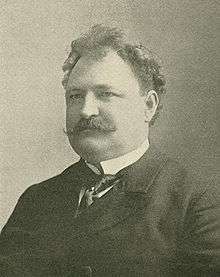Henry Edward Krehbiel

Henry Edward Krehbiel (March 10, 1854 – March 20, 1923) was an American music critic and musicologist.
Biography
Krehbiel was born in Ann Arbor, Michigan. He received a general education from his father, a German clergyman of the Methodist Episcopal Church, and began in 1872 the study of law in Cincinnati, Ohio. In June, 1874, he was attached to the staff of the Cincinnati Gazette as musical critic, which post he held until November, 1880.
He then went to New York, where he became musical editor of The New York Tribune. He became an influential music critic, writing many articles for the Tribune, Scribner's Monthly, and other journals. He wrote many books about various aspects of music, including one of the earliest examinations of African American music. He annotated concert programs (including many of Paderewski's recitals).
Krehbiel translated some opera libretti, including: Nicolai's Die lustigen Weiber von Windsor (1886), Paderewski's Manru (1902), and Mozart's Der Schauspieldirektor (1916). (Dates given are the first performance of the English translation.) When Mozart's Così fan tutte was performed for the first time in the US, in 1922, it was in a new English version with a text by Krehbiel.[1] He also translated the biography of Beethoven written by Alexander Wheelock Thayer, first published in English in 1921.
Krehbiel was a strong supporter of music by Wagner, Brahms, Dvořák,[2] and Pyotr Ilyich Tchaikovsky when they were not yet well known in America. He detested French music, and together with his assistant, Richard Aldrich, he waged a continuing campaign against it.[3] After Debussy's La mer was introduced in the US in 1907, Krehbiel wrote:
Last night's concert began with a lot of impressionistic daubs of colour smeared higgledy-piggledy on a tonal palette, with never a thought of form or purpose except to create new combinations of sounds. ... One thing only was certain, and that was that the composer's ocean was a frog-pond, and that some of its denizens had got into the throat of every one of the brass instruments.[4]
It caused some amusement when after Debussy's work became a staple of the orchestral repertoire Krehbiel felt obliged write in 1922 that La mer was "a poetic work in which Debussy has so wondrously caught the rhythms and colors of the seas."[5]
When Krehbiel died in March 1923, still in post as critic of The New York Tribune, Aldrich wrote in a tribute that Krehbiel had been "the leading musical critic of America" who raised musical criticism to an eminence it had never previously enjoyed in the US.[1]
Books by Krehbiel
- The Technics of Violin Playing (1880)
- Notes on the cultivation of choral music and the Oratorio Society of New York (1884)
- Studies in the Wagnerian drama (1891)
- How to listen to music; hints and suggestions to untaught lovers of the art (1897)
- Music and manners from Pergolese to Beethoven (1898)--essays
- Chapters of opera (1908)--revised 1911
- A Book of operas (1909)
- Pianoforte and its music (1911)
- Afro-American folksongs: a study in racial and national music (1914)
- A second book of operas (1917)
- More chapters of opera (1919)
- The life of Ludwig van Beethoven, by Alexander Wheelock Thayer (1921)--Edited by Krehbiel
References
- 1 2 Aldrich, Richard. "Henry Edward Krehbiel", Music & Letters, July 1923, pp. 266–268 (subscription required)
- ↑ Krehbiel, Henry Edward. Afro-American Folksongs: A Study in Racial and National Music: 6-7
- ↑ Brody, Elaine. "Vive La France: Gallic Accents in American Music from 1880 to 1914", The Musical Quarterly, vol. 65, no. 2, 1979, pp. 200–211 (subscription required)
- ↑ Krehbiel, Henry, The New-York Tribune, 22 March 1907, quoted in Leary and Smith, p. 15
- ↑ Leary and Smith, p. 135

Sources
External links
- Works by Henry Edward Krehbiel at Project Gutenberg
- Works by or about Henry Edward Krehbiel at Internet Archive
- Works by Henry Edward Krehbiel at LibriVox (public domain audiobooks)
